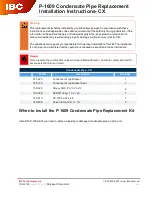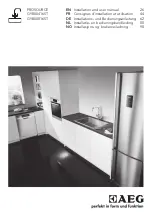
Benchmark Platinum-Edge [ii]: Operation-Service Manual
SECTION 4
– INITIAL START-UP
OMM-0137_J
• 12/20/2022 Technical Support • (800) 526-0288 • Mon-Fri, 8 am - 5 pm EST Page
44
of
167
NATURAL GAS Manual Combustion Calibration Instructions
16. With the valve position still at 100%, insert the combustion analyzer probe into the exhaust
manifold probe opening (see Figure 4-2a
– 4-2c in Section 4.2.3) and allow enough time
for the combustion analyzer reading to stabilize.
17.
Compare the combustion analyzer’s oxygen (O
2
) reading to the
O
2
value in the
Reading
column (Figure 4-6). If they differ, go to the
Main Menu
→
Calibration
→
Input/Output
→
O2 Sensor
screen and adjust the
O2 Offset
parameter, up to
±3%
, to make the on-board
O
2
sensor match the value from the combustion analyzer. If your combustion analyzer is
correctly calibrated, and the on-board O
2
sensor cannot be made to match the analyzer,
the sensor may be defective and need to be replaced.
18. Compare the
O
2
value in the
Target
and
Reading
columns.
If they don’t match, adjust the
Blower Voltage
until the
O
2
value in both
columns
match; use either the
+
or
–
controls, or
press on the field and type the value directly.
19. If adjusting the blower voltage is not sufficient to get the
O
2
Reading
column to match the
Target
column, then repeat Step 15 to adjust the gas pressure up or down within the range
shown in the table, then repeat Step 18. Continue repeating Steps 15 and 18 until the gas
pressure is within the range in Table 4-1 and the
O
2
Reading
column matches the
Target
column.
20.
Enter the downstream manometer’s gas pressure reading in the
Downstream Gas
Pressure
field. Note, this field appears only when
Valve Position %
=
100%
.
21. Compare the measured nitrogen oxide (NOx) and carbon monoxide (CO) readings to the
Target
values in Table 4-2 (shown as a reference only). If you chose the NOx <=9 ppm in
step 9, use the values in the
Ultra-Low NOx
columns. If you are not in a “NOx-limited”
area and/or do not have a NOx measurement in your analyzer, set the O
2
to the value in
the
Standard NOx
column in the table below.
TABLE 4-2: NATURAL GAS Calibration Target Values @ 100% Valve Position
Model
Standard NOx
Ultra-Low NOx
CO
O
2
%
NOx
O
2
%
NOx
750
5.5% ± 0.2%
≤20 ppm
6.0% ± 1.0%
≤9 ppm
<100 ppm
1000
5.5% ± 0.2%
≤20 ppm
6.0% ± 1.0%
≤9 ppm
<100 ppm
1500
5.2% ± 0.2%
≤20 ppm
5.7% ± 1.0%
≤9 ppm
<100 ppm
2000
6.0% ± 0.2%
≤20 ppm
6.0% ± 1.0%
≤9 ppm
<100 ppm
2500
5.6% ± 0.2%
≤20 ppm
-
-
<100 ppm
3000
5.1% ± 0.2%
≤20 ppm
-
-
<100 ppm
3000 DF
5.3% ± 0.2%
≤20 ppm
-
-
<100 ppm
4000/5000N * 5.5% ± 0.2%
≤20 ppm
6.0% ± 0.2%
≤9 ppm
<100 ppm
5000/6000
5.5% ± 0.5%
≤20 ppm
6.0% ± 1.0%
≤9 ppm
<100 ppm
* The 4000, 4000DF, 5000N and 5000NDF can operate at 4.5% O
2
at full fire in jurisdictions
that do not have NOx restrictions
.
NOTES:
These instructions assume that the
inlet air temperature is between 50°F and 100°F
(10°C
– 37.8°C)
. If NOx readings exceed the target values in Table 4-1, above, or Table 4-
3, below, increase the O
2
level up to 1% higher than the Target value. You must then record
the increased O
2
value on the Combustion Calibration sheet.
















































